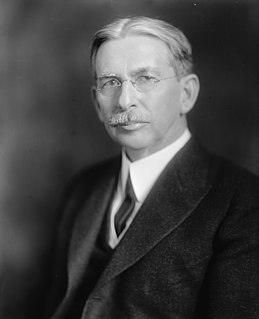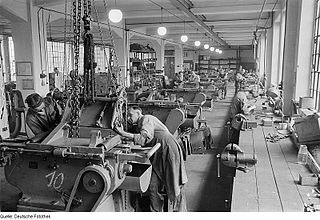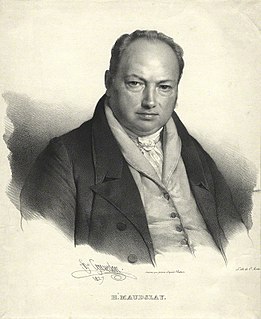
James Hall Nasmyth was a Scottish engineer, philosopher, artist and inventor famous for his development of the steam hammer. He was the co-founder of Nasmyth, Gaskell and Company manufacturers of machine tools. He retired at the age of 48, and moved to Penshurst, Kent where he developed his hobbies of astronomy and photography.

A machine tool is a machine for shaping or machining metal or other rigid materials, usually by cutting, boring, grinding, shearing, or other forms of deformation. Machine tools employ some sort of tool that does the cutting or shaping. All machine tools have some means of constraining the workpiece and provide a guided movement of the parts of the machine. Thus the relative movement between the workpiece and the cutting tool is controlled or constrained by the machine to at least some extent, rather than being entirely "offhand" or "freehand".

The Standard Motor Company Limited was a motor vehicle manufacturer, founded in Coventry, England, in 1903 by Reginald Walter Maudslay. It purchased Triumph in 1945 and in 1959 officially changed its name to Standard-Triumph International and began to put the Triumph brandname on all its products.

Hyundai Heavy Industries Co., Ltd. is the world's largest shipbuilding company. Its headquarters are in Ulsan, South Korea. HHI was founded in 1972 by Chung Ju-yung as a division of the Hyundai Group, and in 1974, completed building its first ships. In 2002, the company was spun-off from its parent company. HHI has four core business divisions: Shipbuilding, Offshore & Engineering, Industrial Plant & Engineering, and Engine & Machinery. HHI also has five non-core related subsidiaries: Hyundai Electric & Energy Systems, Hyundai Construction Equipment, Hyundai Robotics, Hyundai Heavy Industries Green Energy, and Hyundai Global Service.

Richard Roberts was a Welsh patternmaker and engineer whose development of high-precision machine tools contributed to the birth of production engineering and mass production.

Associated Equipment Company (AEC) was an English vehicle manufacturer that built buses, motorcoaches and trucks from 1912 until 1979. The name Associated Equipment Company was hardly ever used; instead it traded under the AEC and ACLO brands.
Joseph Clement was a British engineer and industrialist, chiefly remembered as the maker of Charles Babbage's first difference engine, between 1824 and 1833.

A surface plate is a solid, flat plate used as the main horizontal reference plane for precision inspection, marking out (layout), and tooling setup. The surface plate is often used as the baseline for all measurements to a workpiece, therefore one primary surface is finished extremely flat with tolerances below 11.5 μm or 0.0115 mm per 2960 mm for a grade 0 plate. Surface plates are a very common tool in the manufacturing industry and are often permanently attached to robotic-type inspection devices such as a coordinate-measuring machine. Plates are typically square or rectangular.

A metal lathe or metalworking lathe is a large class of lathes designed for precisely machining relatively hard materials. They were originally designed to machine metals; however, with the advent of plastics and other materials, and with their inherent versatility, they are used in a wide range of applications, and a broad range of materials. In machining jargon, where the larger context is already understood, they are usually simply called lathes, or else referred to by more-specific subtype names. These rigid machine tools remove material from a rotating workpiece via the movements of various cutting tools, such as tool bits and drill bits.

Guy Motors was a Wolverhampton-based vehicle manufacturer that produced cars, lorries, buses and trolleybuses. The company was founded by Sydney S. Guy (1885-1971) who was born in Kings Heath, Birmingham. Guy Motors operated out of its Fallings Park factory from 1914 to 1982, playing an important role in the development of the British motor industry.

James Hartness was an American inventor; a mechanical engineer; an entrepreneur who mentored other inventors to develop their machine tool products and create a thriving industrial center in southeastern Vermont; an amateur astronomer who fostered the construction of telescopes by amateurs in his town; an early aviator who built one of Vermont's first airports; and the 58th Governor of Vermont from 1921 to 1923.
Sir John Paul Black held several senior positions in the British motor industry including chairman of Standard-Triumph.

Joshua Field FRS was a British civil engineer and mechanical engineer.
Associated Commercial Vehicles (ACV) was a holding company formed on 1 October 1948 when Associated Equipment Company purchased Crossley Motors and Maudslay Motor Company. In 1949 ACV took control of coachbuilding firm Park Royal Vehicles, along with its subsidiary Charles H Roe, followed in 1961 by Thornycroft. In 1962, ACV was purchased by Leyland Motors

A machine factory is a company, that produces machines. These companies traditionally belong to the heavy industry sector in comparison to a more consumer oriented and less capital intensive light industry. Today many companies make more sophisticated smaller machines, and they belong to the light industry. The economic sector of machine factories is called the machine industry.

New Avon was a British vehicle coachbuilder. The company, based in Warwick, was started when a Mr Ben Tilton and a Captain Philips trading as Avon Coachworks went into business in 1919 to make bodywork for cars. Following a change of ownership and financial reconstruction it became New Avon in 1922.

















